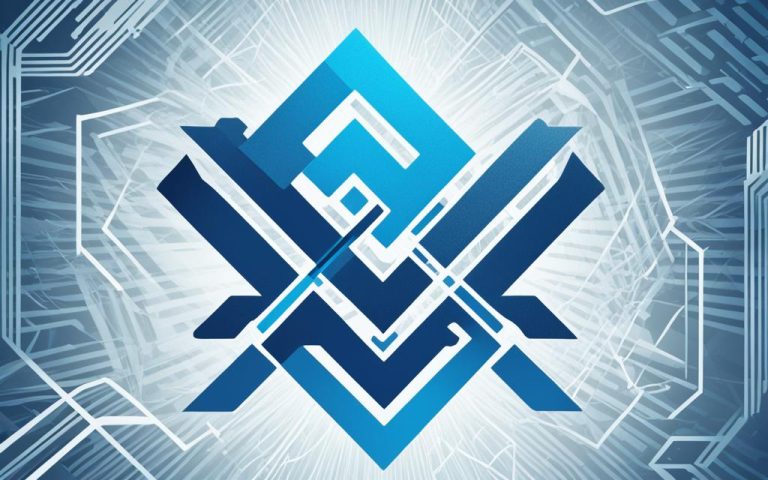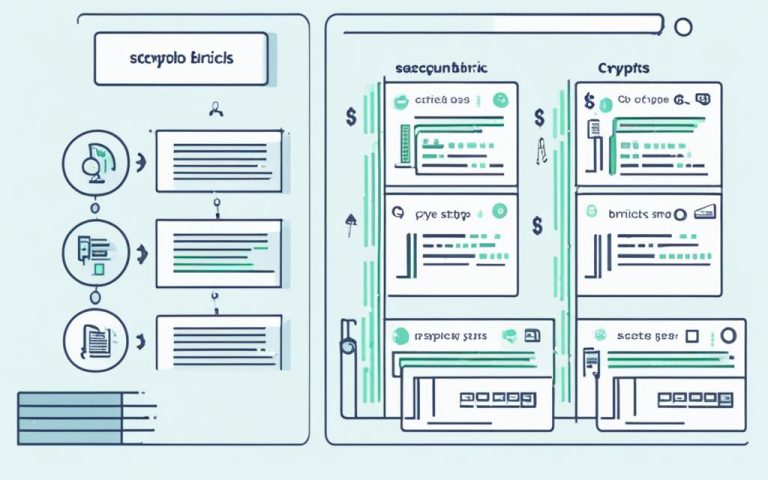The world of blockchain technology is growing fast. It offers many chances for businesses to get better at what they do, boost security, and change digital payments. At its heart, predefined business logic helps blockchain work well and keeps it safe.
Business logic in blockchain talks about the consensus algorithm. This algorithm makes sure all network nodes agree. This agreement lets the blockchain have smooth and reliable interactions.
Smart contracts are key in the blockchain world. Imagine them as automatic deals in the blockchain’s code. They start working once certain conditions are met. This cuts out middlemen and makes things run smoother.
A blockchain is like a shared database for all the network’s nodes. It’s a safe place to keep and track digital transactions. Being decentralized, blockchain has lots of benefits. It makes things more secure, cuts down on extra steps, and saves money. It also boosts communication, improves efficiency, and helps trust grow. Plus, it allows for new types of apps to be created.
Blockchain can change many areas, like insurance, finance, and supply chains. Using this new tech can change how we work. It brings more trust, openness, and efficiency.
We will keep looking into blockchain technology. We’ll explore how it changes businesses in many fields. Stay with us to learn more about this exciting development.
The Role of Consensus Algorithms in Blockchain
Consensus algorithms are key to blockchain technology. They help all nodes agree when validating and adding new transactions. These powerful algorithms let blockchain networks reach consensus with accuracy and security.
The consensus algorithm acts as the decision-making logic in the blockchain network. It sets rules for verifying and adding transactions to the ledger. This is important for removing the need for a central authority, allowing trust and transparency.
Proof of Work (PoW) is a common consensus algorithm in blockchain. In PoW, nodes solve complex puzzles to add transactions to the chain. The first to solve the puzzle can add the next block. This requires a lot of computational effort, which secures the chain against attacks.
Proof of Stake (PoS) is another popular method. In PoS, nodes are chosen based on their cryptocurrency stake. This reduces the need for computational power, saving energy and speeding up transactions.
Consensus algorithms work well even in tough conditions, ensuring accuracy and robustness. They keep blockchain transactions secure and intact by reaching agreement among nodes.
https://www.youtube.com/watch?v=nsyUoN1nMXM
The Importance of Consensus Algorithms
Consensus algorithms are crucial for blockchain’s efficiency, security, and transparency. They cut out middlemen, improving blockchain’s autonomy and immutability.
“Consensus algorithms form the backbone of blockchain technology, ensuring that transactions are validated in a decentralized manner, ultimately fostering trust and reliability within the network.” – Vitalik Buterin
These algorithms allow for distributed consensus. Everyone on the network has the same, secure ledger. This trust revolutionizes industries like finance, supply chain, and healthcare.
The Future of Consensus Algorithms
Blockchain technology and consensus algorithms are evolving. New methods are being developed to improve scalability, efficiency, and security. Innovations like Proof of Authority (PoA), Delegated Proof of Stake (DPoS), and Practical Byzantine Fault Tolerance (PBFT) offer benefits for different needs.
These advancements aim to overcome blockchain’s challenges, such as energy use, slow transactions, and scalability. They could change industries, spur innovation, and redefine business transactions.
Smart Contracts: Enabling Business Process Fulfillment in Blockchain
The Role of Smart Contracts
Smart contracts are key to blockchain technology. They enable automated and smooth business operations. These protocols verify and enforce contracts without a hitch.
What are Smart Contracts?
Smart contracts are digital agreements on the blockchain. They work automatically, enforcing contract rules by themselves. There’s no need for intermediaries or paper.
Thanks to blockchain, smart contracts build trust without relying on third parties. They’re secure, clear, and cannot be changed, making business deals safer.
The Functionality of Smart Contracts
Smart contracts are code that carry out tasks when certain conditions are met. They’re saved on the blockchain, ready for parties to use them. This code lets businesses do things like manage supplies and transfer assets easily.
Because they’re decentralized, smart contracts keep transactions safe and trackable. This lowers the chance of fraud.
Benefits of Using Smart Contracts
“Smart contracts streamline business operations and empower organizations by removing intermediaries and enabling direct peer-to-peer interactions.”
Smart contracts come with many benefits:
- Efficiency: They make processes automatic, cutting out human error.
- Transparency: Being decentralized, every transaction is open to authorized users.
- Security: Their use of cryptography and decentralization keeps data safe.
- Cost Savings: They cut out middlemen, saving on verification and enforcement costs.
Using smart contracts, companies can be more efficient, transparent, and secure. They simplify operations, cut costs, and build trustworthy relationships in business.
Harnessing the Benefits of Blockchain Technology in the Enterprise
Blockchain technology brings a lot of advantages to business models. It greatly improves data security, especially in healthcare and travel. This technology ensures transaction integrity and keeps sensitive data safe from unwanted access.
Blockchain also cuts down the need for reconciliation tasks. It removes the middlemen by offering a decentralized network. Everyone has the same, up-to-date info. This saves time and money for businesses.
Moreover, blockchain boosts trust with its openness and shared control. A distributed database records every deal securely. Once done, no one can change these records. This makes every transaction trustworthy.
Smart contracts are crucial in blockchain for businesses. They work on their own, following set rules, and cut down on manual work. This makes business deals more secure and less costly.
Read more about the predefined business logic within a Learn more about blockchain technology Discover how blockchain technology helps organizations in data
FAQ
What is the role of the consensus algorithm in a blockchain?
The consensus algorithm helps nodes agree on the same data on a blockchain. It tackles challenges like errors or data clashes efficiently. This keeps the system accurate and secure, even when things go wrong.
How do consensus algorithms work in a blockchain?
Consensus algorithms keep the blockchain secure by checking node statuses and finding a common ground. This method ensures all nodes agree, keeping transactions safe and unaltered.
What are smart contracts and how do they enable business process fulfillment in blockchain?
Smart contracts are digital agreements that make blockchain useful for business. They automatically carry out contract terms, ensuring promises are kept. With smart contracts, every transaction is recorded transparently, making processes trustworthy.
What benefits does blockchain technology offer for enterprise business models?
Blockchain boosts data security and cuts down on the time needed for checks. It streamlines transactions, ensures safe communication, and removes middlemen. By using blockchain, businesses can cut costs, foster trust, and improve transaction security.



















